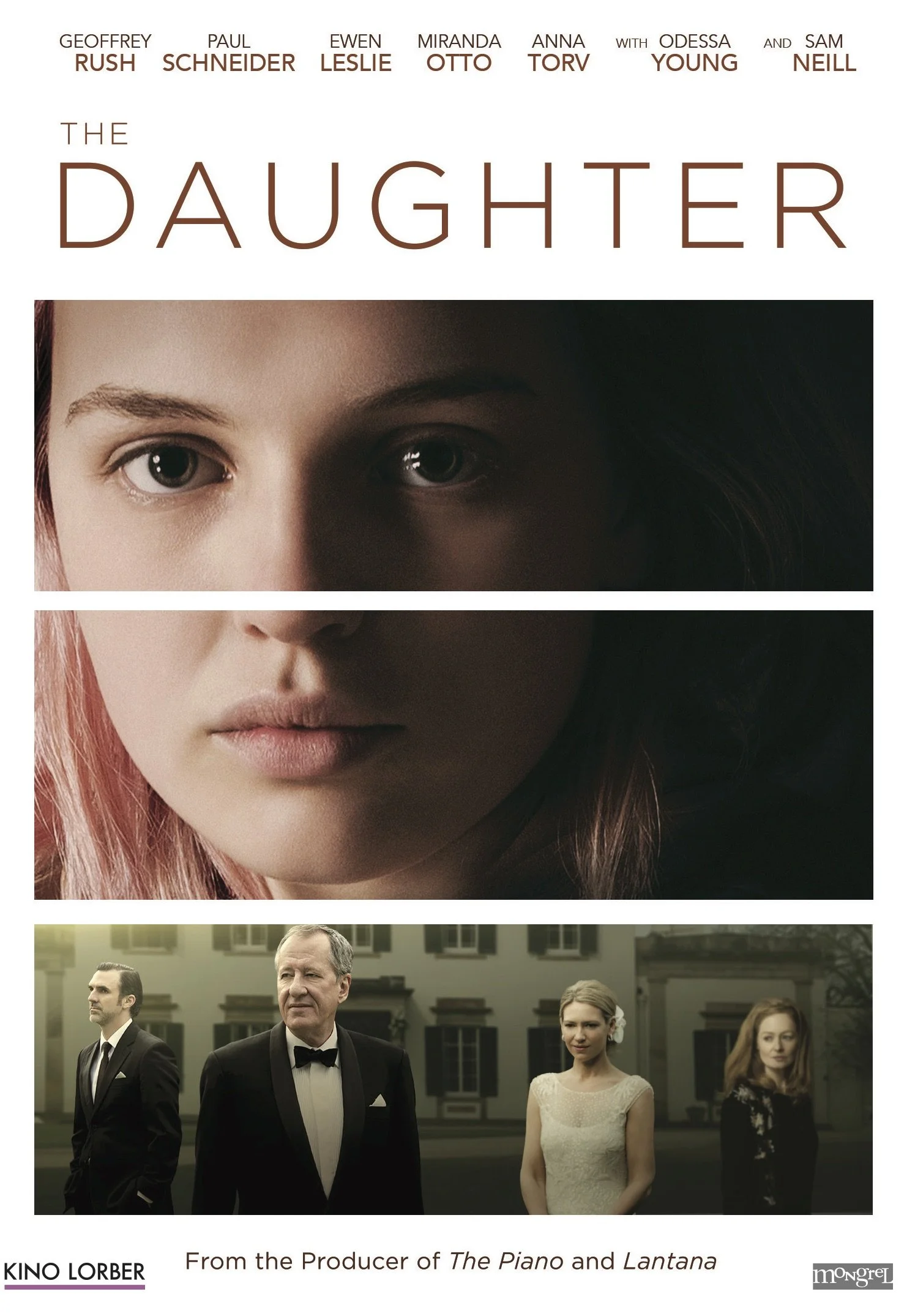The Daughter (2015) Film Review
With “The Daughter” (2015), writer-director Simon Stone adapts a 19th century play which hinges on a character’s rigid idealism and redirects the narrative to reflect contemporary society’s hyper-individualism. Henrik Ibsen’s “The Wild Duck”, ironic in tone, mocks the character Gregor’s belief in the spiritual righteousness of truth-telling at all costs. Renamed Christian in Stone’s film (excepting Hedvig, all the characters are rechristened), a son’s motivation for revealing family secrets becomes envy and retaliation. In both scenarios, a family implodes, and a young woman pays for the adults’ malfeasance.
The drama is set in motion as Christian (Paul Schneider), a businessman based in the United States, returns to Australia for his father’s wedding. Over the course of the film, we learn that Christian’s mother committed suicide; a calamity that Christian blames on his father Henry (Geoffrey Rush), and his multiple affairs. The tension boils over during a dinner in which the relationship is laid bare. Henry defends himself by saying his wife’s mental illness was beyond his control. Christian, in narcissistic fashion, barks “What about me? When do I get my turn (at happiness)?”
Christian and Henry’s noxious relationship is contrasted with the father-son dynamic between his best friend Oliver (Ewen Leslie) and his dad, Walter (Sam Neill). Walter was in business with Henry and went to jail rather than implicate his partner in their illegal scheme. As a result, Oliver drops out of school and goes to work (for Henry!) to support his family. Now a free man, Walter lives with Oliver, his wife Charlotte (Miranda Otto), and their daughter Hedvig (Odessa Young). Hedvig, much savvier than her counterpart in the play, is the pride of her father. Academically gifted and confident in her sexuality, she is expected to exceed her parents’ accomplishments.
In another departure from Ibsen’s work, Christian is married. However, his wife declines to accompany him to Australia. She, in fact, asks for a divorce when Christian contacts her. This leads Christian, a recovering alcoholic, to embark on a drinking binge. He is late for his father’s wedding ceremony and continues his rage-infused bender during the reception. Oliver and Charlotte are also in attendance. As they dance with joy, with themselves and their daughter, Christian can no longer contain his destructive bitterness.
Filmmaker Simon Stone leaves room for the viewer’s imaginative participation. The scene in which Christian tells Oliver that Henry is Hedvig’s biological father happens offscreen. Likewise, when Christian is about to divulge the same information to Hedvig, the scene is elided. The viewer is a witness to Hedvig’s emotional devastation. While Christian bears the brunt of responsibility, none of the adults is entirely innocent. When Hedvig encounters Oliver after the truth is known, he brutally rejects her. “I can’t stand to look at you,” he bellows to her stunned visage.
In the play, there is no ambiguity as to subsequent events. Hedvig commits suicide. In “The Daughter”, the ending is left to the viewer to decide. The final shot is of Hedvig unconscious in her hospital bed. While it appears that Oliver and Charlotte will reconcile, the fate of Christian and his father is left unresolved.
My only quibble with “The Daughter” is the casting of Paul Schneider as Christian. His performance is, at times, awkward and implausible, particularly when his character is supposed to be inebriated. An actor who is playing an alcoholic should excel at playing those scenes. My judgement is reinforced by the fact that all the other actors, (Sam Neill, Geoffrey Rush, Odessa Young, Miranda Otto) won multiple nominations and awards for their performances.
In R. Farquharson Sharp’s introduction to a publication of “The Wild Duck”, he opines that the only weak point in Ibsen’s drama is the symbolism of the duck. “Its purport is too vague for it to be of any value,” he states. “The Daughter” corrects that defect. The wild duck, which Henry shoots in the film’s opening sequence, represents Hedvig and the wounds inflicted by her family. Hedvig releases the duck back into the wild before her suicide attempt. The wild duck survives his encounter with her family. I think it is filmmaker Stone’s signal that Hedvig is likewise resilient enough to endure.
“The Daughter” is currently streaming on Amazon Prime Video. Click to watch.
Content copyright © 2024 by Angela K. Peterson. All rights reserved.
This content was written by Angela K. Peterson. If you wish to use this content in any manner, you need written permission.


